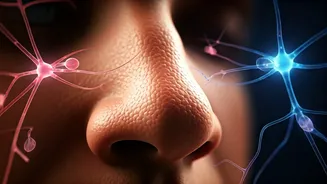The Sniff Test & Life
Recent research has brought to light a compelling link between our sense of smell and our lifespan. Studies, including those focused on olfaction, indicate
that our ability to detect odors could potentially predict how long we will live. This fascinating area of study is revealing more about the intricate connections between our sensory experiences and overall health. The ability to identify various scents may be a reflection of neurological health, which in turn is related to physical health. As olfactory function decreases, it may serve as an early indicator of future health concerns.
Smell's Brain Connection
The sense of smell, also known as olfaction, is unique because of its direct pathway to the brain. Odor molecules enter the nasal cavity and are sensed by the olfactory bulb, which transmits signals to several parts of the brain. The olfactory bulb has direct connections to areas like the amygdala, the emotional center, and the hippocampus, which is essential for memory. This unique connection between smell and these vital parts of the brain may explain the powerful impact scents have on our emotions and memories. This direct pathway also means that changes in smell perception can quickly impact brain functions and potentially reflect overall neurological health.
Body Odor & Health
While the ability to detect and identify scents in the environment is important, body odor can also reveal insights into a person's health. Body odor, which includes the scents people produce, is influenced by factors such as genetics, diet, hygiene, and overall health. Changes in body odor could be an early indicator of specific health problems, such as kidney disease or diabetes. Therefore, examining these changes is essential. This link indicates the body's natural signals and potential early warning signs. By examining body odor, you may be able to identify potential health issues early.
Implications for Longevity
The research on smell and life expectancy shows an important point: our sense of smell serves as a potential window into overall health and potential lifespan. The capacity to correctly identify different smells is linked to cognitive health. Cognitive decline is often associated with age-related illnesses. The ability to retain a strong sense of smell may indicate a slower rate of cognitive decline and perhaps a longer life. The more we learn about the connection between smell and health, the more we can develop effective early detection strategies to improve well-being. It is a subtle but strong link that may help individuals and medical professionals identify and address health issues early.














